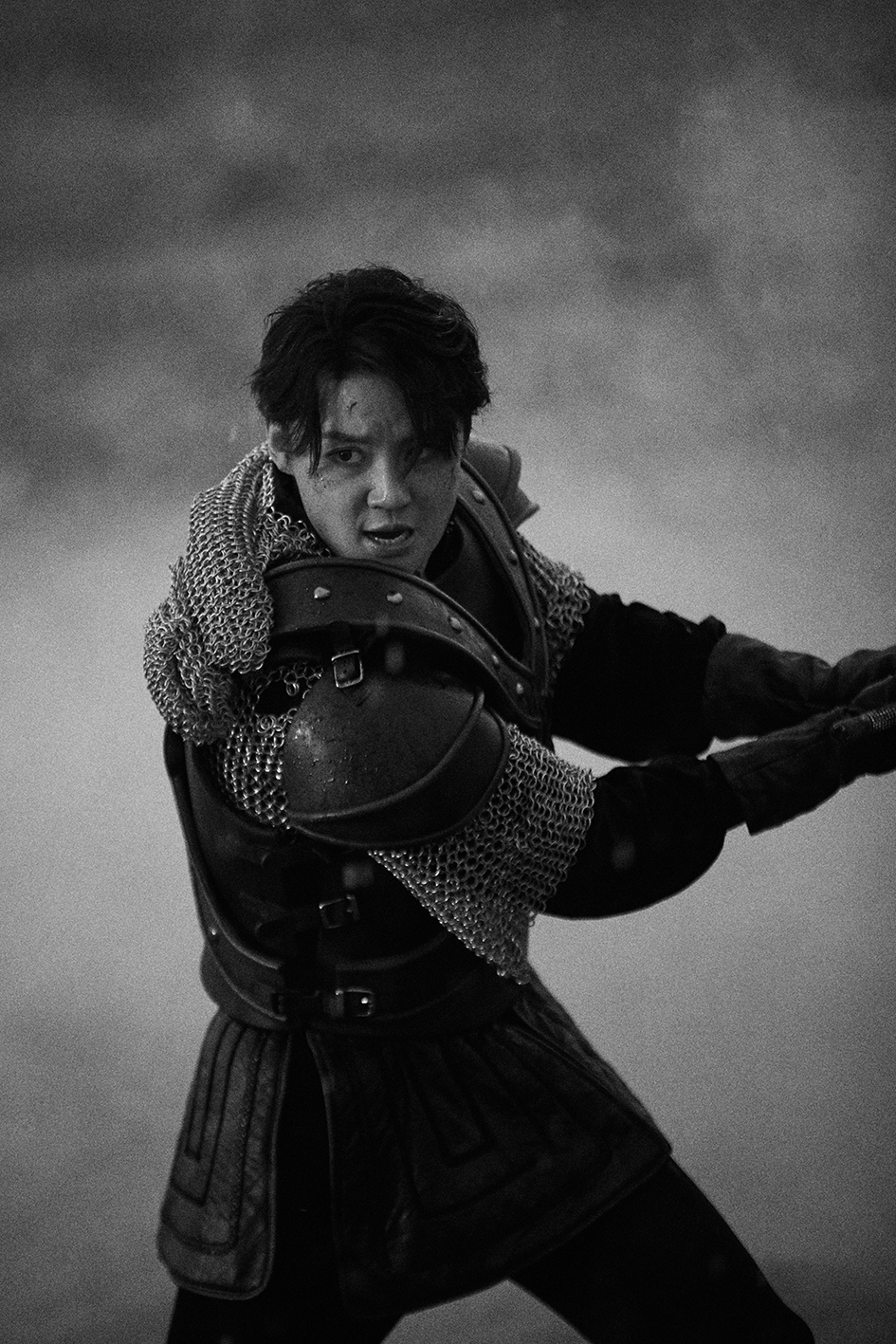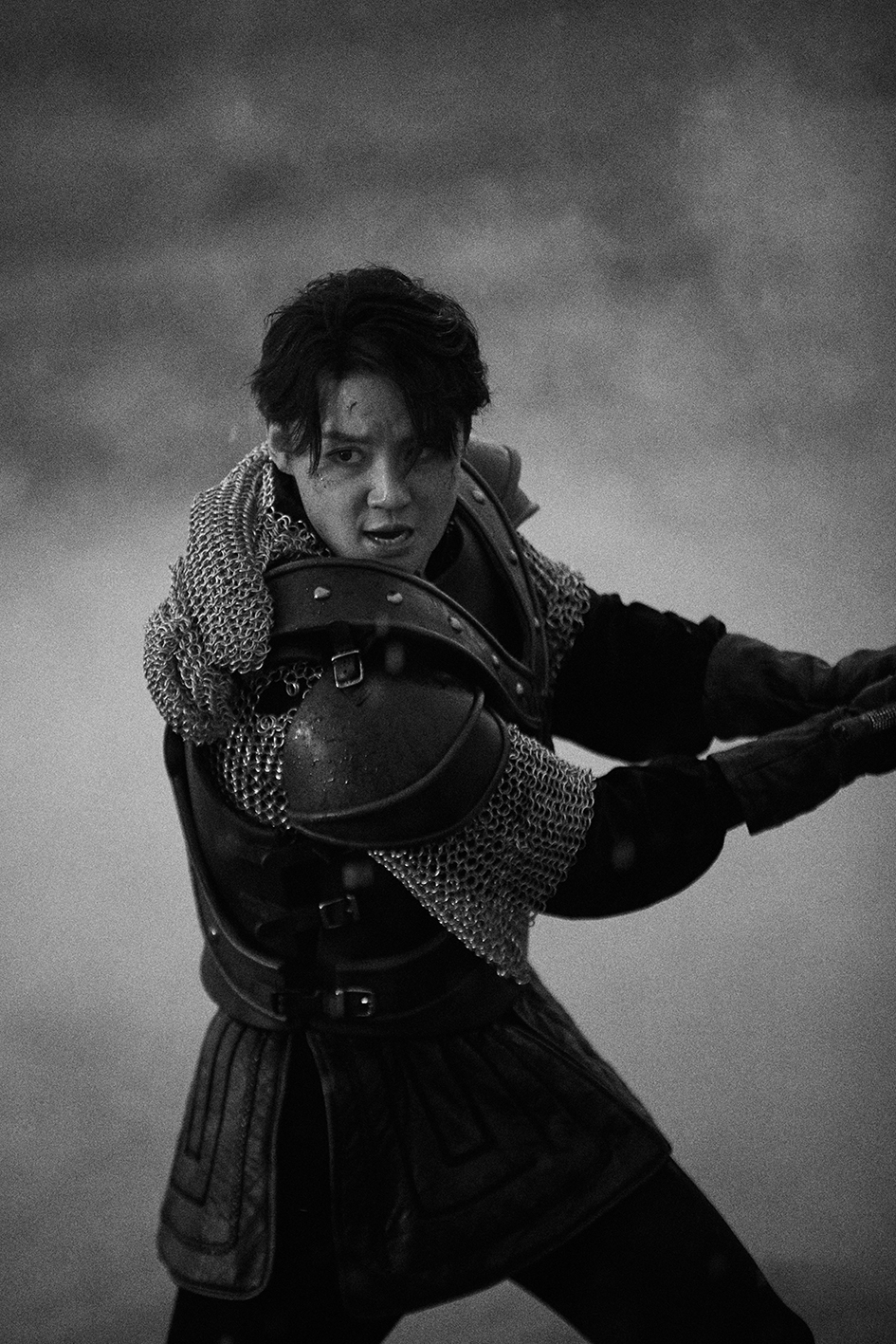
For musical theater actor Kim Junsu, the musical Xcalibur seems to be the natural next step after all the experience he has accumulated over a decade-long acting career. Up until now, Kim has generally portrayed especially talented geniuses, nonhuman characters, and powerful loners, such as the titular Mozart!, the personification of Death in Elisabeth, the famous vampire in Dracula, the Musical, and L in Death Note: The Musical. These shows explore the rapture that comes with power but also the overwhelming loneliness to which such characters are doomed. What makes Xcalibur unique among his performances can be seen in the beginning as his character, Arthur, lives out an ordinary life, happily surrounded by his loved ones.
Despite all the chaos surrounding the war and all the people’s desire to escape the pain, Arthur lives an average life with his kind father and his neighborhood friends, some of whom are close enough to be like brothers to him. While the characters Kim has played in other productions long for love and their humanity and eventually return to human form, Arthur’s journey from ordinary to extraordinary in Xcalibur is awe-inspiring. The Arthur we meet at the beginning of the play does not want to be a hero. The druid magician Merlin tells him that Arthur is destined to pull out Excalibur from a stone and become king, but before Arthur can decide to pull out the sword, he must first face up to the truth: There was nothing fortuitous about his birth and his loving father is not his birth father. In Xcalibur, we discover that fate and lineage are not what determine who becomes king, but rather the willpower Arthur exhibits given the circumstances, agonizing over whether or not he should accept his fate and his bloodline.
But Guinevere, who appears immediately after Arthur pulls Excalibur from the stone, already has an answer for him. When Arthur asks Guinevere whether she believes in fate, she replies that there is no such thing and that she believes in the human will instead. Even when Arthur asks her whether their encounter is a matter of fate or willpower, she says there is no clear way to distinguish between the two. She explains how the fact that Arthur pulled out the sword after deciding to do so means he necessarily did so by his conscious will and effort, and that their encounter, too, is a matter of both fate and will. She also says he became king through sheer volition, not because he pulled out Excalibur or because he is the son of the tyrannical Uther Pendragon. The power and authority of the person who wields Excalibur depends entirely on what kind of person they are; the choices each makes when faced with a given situation will differ and ultimately be the result of their individual personality, not unlike the way Arthur is portrayed through the actor’s personal interpretation, and the character’s charm depends on that which the actor brings to him.
In character as the average Arthur, Kim feels quite unfamiliar to audiences used to seeing him in his previous roles. Kim, however, appears completely comfortable in the role. He looks like he has always been that kind of everyday person, fitting in perfectly with the happy ensemble cast. Though he refuses to grow up, the childlike Arthur is a surprisingly good fit for Kim, who tends to take on more mature roles. The potential for awkward casting is there, but Kim pulls it off flawlessly, acting to suit the character’s age. Until he becomes king, Arthur, a character with both light and dark sides to him, goes through a turbulent period of personal growth. He navigates his love for Guinevere, the death of his father, distrust and opposition from the Knights of the Round table, deception at the hands of Morgan le Fay and betrayal by those he trusted; Kim, portraying all these events in character, slides into the role as though he has been an actor since birth, fully accustomed to the grammar of the stage. After experiencing great pain and separation from his loved ones, Arthur becomes a new person and the rightful owner of Excalibur through the beliefs he picks up from Guivenere. In the final part of the show, Kim sobs his way through the song “What Makes a King?” in a vivid outpouring of the pain and responsibility he had to grapple with before laying his hands on Excalibur. Only after all the tears, and the pain brought on by his own mistakes and the betrayals of others, can Arthur say goodbye to the fairytale-like childhood he held onto and finally move forward in an affirmation of his choice and, therefore, his willpower, with Excalibur in hand. He wipes away the division between fate and volition by making decisions for himself at last. We can fully feel the gap he has bridged between his days as an ordinary, happy child and his new life as king.
The musical theater stage may not have been where Kim had been steering toward when he first began his career as a singer, but he and musicals have become inseparable and an irreplicable part of one another in 2022. He began as an outsider who broke into the musical field with his huge fan base at his back and has continued to entrench his place in this world in a tightrope walk between outsider and juggernaut. In the end, he’s integrated himself completely into the musical theater sphere, so we can expect even more to be said about the actor Kim Junsu from here on out. Numerous popular singers have made the jump to musical theater, and many idols to come will surely act on the stage as well, but there has never been another actor like Kim, and there never will be. Now everyone knows who he is and what he is here for—a man who just happened to grab that fateful sword in his desire to join the town square of actors.
Unauthorized reproduction and distribution prohibited.
